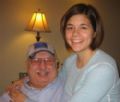Hypoglycemia, or low blood sugar, is a common complication of diabetes. In fact, the majority of people with type 1 or type 2 diabetes will experience hypoglycemia at one time or another—even if their diabetes is well-controlled. Hypoglycemia can quickly become a medical emergency if it is severe or goes untreated. That's why it is so important to be able to recognize the signs and symptoms of low blood sugar, understand how to treat it at home and know when to seek additional medical attention.
What causes diabetes-related hypoglycemia?
- Physical activity
- Delaying or skipping a meal or snack
- Not eating enough at a given meal or snack
- Insulin
- Some oral medications used to treat diabetes
What are the symptoms of hypoglycemia?
Hypoglycemia can develop very rapidly, and its symptoms can occur suddenly.
- Nervousness
- Shaking
- Sweating
- Dizziness
- Feeling weak
- Irritability
- Headache
- Rapid heartbeat
- Hunger
Whenever you experience any of the symptoms above, it is recommended that you test your blood sugar. If it is not possible to check your blood sugar and you are experiencing these symptoms, always assume that your blood sugar is low and treat it accordingly.
How to Treat Hypoglycemia at Home
The primary treatment of low blood sugar is simply to eat one 15-gram serving of any carbohydrate food that is mainly sugar. Sugar-based carbohydrates digest and enter your bloodstream quickly, which can raise blood glucose levels back to normal. Carbohydrate foods that have significant amounts of sugar, but also large amounts of fat or protein—such as chocolate, cookies, ice cream, and more—are digested much more slowly and will not correct low blood sugar as efficiently.
Recommended Carbohydrate Foods to Treat Low Blood Sugar
| Serving Size (15 grams) |
Carbohydrate Food |
| 1/2 cup |
Regular soda pop |
| 1 cup |
Skim or 1% milk |
| 1/2 cup |
Fruit juice |
| 3-4 |
Glucose tablets |
| 4 teaspoons |
Sugar |
| 1 Tablespoon |
Honey, syrup, or jam |
| 5-6 |
Hard candies (i.e. Lifesavers or peppermints) |
After eating one serving of any item listed above, wait 15 to 20 minutes, then check blood sugar again if possible. If your blood sugar is still low, or if symptoms persist, treat again with another 15-gram serving of one of the above foods. Wait another 15 to 20 minutes and check your blood again. If your blood sugar remains too low or your symptoms do not go away, repeat the treatment a third time. Again, wait 15 to 20 minutes and recheck your blood sugar if possible. If your blood sugar has not returned to normal or you are still having symptoms 15-20 minutes after your third round of treatment, call 911 for emergency assistance.
Most commonly, hypoglycemia symptoms will go away after this simple at-home treatment. Once your blood sugar has returned to normal, it is important to eat your usual meals and snacks as planned to prevent a recurrence later that day. If you do not have a meal or snack planned within an hour of the episode of low blood sugar, it is best to add an additional small snack that contains carbohydrates along with protein or fat immediately following treatment. An example would be half of a sandwich (with lunchmeat, cheese, or peanut butter) or five to six crackers with cheese or peanut butter.
Important things to remember:
- Prevention is best. Practicing good diabetes self-management can help prevent hypoglycemia. Talk to your doctor about finding a certified diabetes educator or diabetes education program in your area.
- If you have diabetes, carry a quick form of sugar with you at all times.
- Remember to always wear medical identification, such as a necklace or bracelet.
- If you have diabetes, ask your physician whether a Glucagon emergency kit is right for you.
- If you experience low blood sugar several days in a row or at the same time each day, speak with your doctor right away.
- If hypoglycemia is severe enough, an individual can lose consciousness. An immediate call to 911 immediately is necessary should this occur.
For more specific information or help, talk to your health care provider. The American Diabetes Association's National Call Center also offers live advice from 8:30 a.m. to 8 p.m. EST, Monday through Friday at 1-800-DIABETES or 1-800-342-2383.
|



.jpg)


